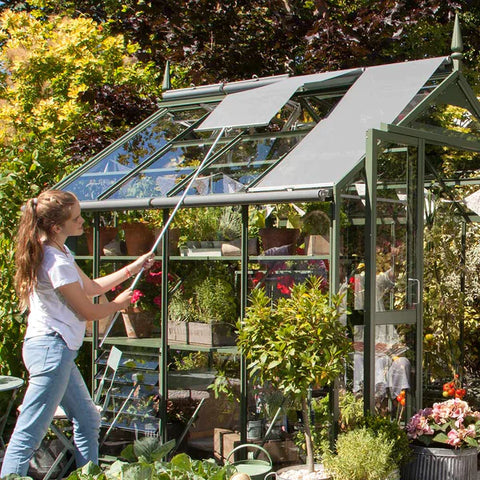If there’s one thing we can all agree on, it’s how absolutely bloomin’ appealing plants are. Not only do they make our world an infinitely more aesthetically pleasing place, but plants also have a myriad of additional well-being benefits. Whether in an emotional, physical or medicinal capacity, humans have harnessed the extraordinary healing superpowers of plants since time immemorial.
Cultivating plants not only brings joy but genuine benefits to your life. Whether you have a cute-as-a-button postage stamp-sized backyard garden, a sprawling spread of shrubs, blooms, and buds, or a family allotment you’re chuffed with – chances are you’re fascinated about how plants can improve our health. To kick off your horticultural health and wellness journey, check out these greenhouses for some sensational solutions.
Perfectly purifying both inside and out
Air pollution is one of the problems many urban dwellers face. Whether outside or inside your home, you’re never sure if the air circulating inside your house is the best quality for you and your family. Plants can assist with maintaining clean air flowing through your home.
Placing air-purifying plants inside your home is the ideal economical solution to protect your family against harmful chemicals and gases. Plants absorb these gases and create fresh air or oxygen, which your body needs to function optimally. According to an article in Good Housekeeping, during photosynthesis, plants convert the carbon dioxide we exhale into fresh oxygen and remove toxins from the air we breathe.
According to research conducted by NASA, several popular houseplants, such as Bamboo Palm and English Ivy, can diffuse toxic chemicals, including benzene, formaldehyde, and trichloroethylene.
Some evergreen purifying house plants you can consider are:
- Dracaena (dragon plants)
- Monstera
- Rubber Plants
- Aloe Vera
- Parlour Palms
- The attractive Peace Lily is a superb choice for producing oxygen and purifying the air in your home. They also help with improved sleep and relaxation.
- Spider Plants (Chlorophytum comosum) add a pop of fresh, green colour to your home and have incredible air-purifying qualities that'll help eliminate any harmful toxins and pollutants, such as formaldehyde and xylene, in the air.
- Chinese Evergreen (Aglaonema): features large, lush, dappled leaves and a long lifespan. This plant helps to humidify and improve air quality by effectively removing air toxins such as formaldehyde and benzene.
- Weeping Fig (Ficus Benjamina): this small shrub-like houseplant is brilliant at beating pollutants emitted from carpeting and furniture, such as benzene, formaldehyde, and trichloroethylene.
Best outdoor purifying plants:
- Common Ivy plant: This plant sports leaves with a large surface area, making them ideal for air purification. They pump out a good amount of oxygen into the atmosphere, thereby freshening the air.
- Aster and Osmanthus plants: Both these plants are bioindicator plants that can alter their appearance when the air surrounding them is polluted beyond an acceptable level.
- Ginkgo biloba plant: This plant is also known as a living dinosaur, having been used for eons by humans for its healing properties. It has excellent CO2 cleaning capabilities.
Oil have some of that!
Essential oils are basically plant extracts. They're made by steaming or pressing various parts of a plant (bark, leaves, flowers, or fruit) to retain the compounds that produce fragrance and healing capabilities. It can take several pounds of a plant to make a single bottle of essential oil.
In addition to creating a fabulous fragrance, essential oils can treat various ailments – from colds and cuts to anxiety and insomnia. The ancient Egyptians were the first to discover the beneficial effects of essential oils. From childbirth to chilblains, essential oils are simply amazing in their versatility. The NHS has some great tips on using essential oils during labour.
Here are a few of our favourites:
Bergamot
Extracted from the Mediterranean citrus fruit peel, this oil has a citrusy and fresh scent. This fragrance is very in demand due to its mood-elevating effect. Bergamot assists in alleviating anxiety, stress, and depression.
Peppermint
A versatile and popular essential oil that originates from peppermint. It smells gorgeously herbal, fresh, and clear. The menthol content of peppermint is exceptionally invigorating and clarifying and can also have an analgesic (pain relieving) effect. It also improves concentration and energy levels.
Rosemary
If you’re finding it hard to get out of bed in the morning, the essential oil from rosemary could be perfect for you as it contains components that boost circulation and concentration.
Eucalyptus
This aromatic oil is frequently used in medicine for its antiseptic, cooling, and cleansing effect. Eucalyptus oil can assist when you’re suffering from a cold by loosening thick mucus in the sinuses and bronchial tubes and helping you breathe freely again.
Tea Tree
Known for its disinfectant and clarifying attributes, tea tree oil is a scientifically proven antiseptic with properties that combat bacterial and fungal infections.
Lemon
This fresh, intense oil deters moths and other pests but also combats ills and chills and stimulates circulation. Its invigorating and mood-enhancing effects will also make you feel good.
Lavender
Lavender essential oil is extremely versatile as it can be both relaxing, motivating, and mood-enhancing.
Say ‘so long’ to stress and adios to anxiety
A study published in the Journal of Physiological Anthropology found that plants in your home or office can make you feel more comfortable and soothed by lowering stress, including heart rate and blood pressure.
Researchers determined that working with plants could reduce both physiological and psychological stress. For people suffering from the symptoms of mental illness, indoor gardening can be beneficial.






